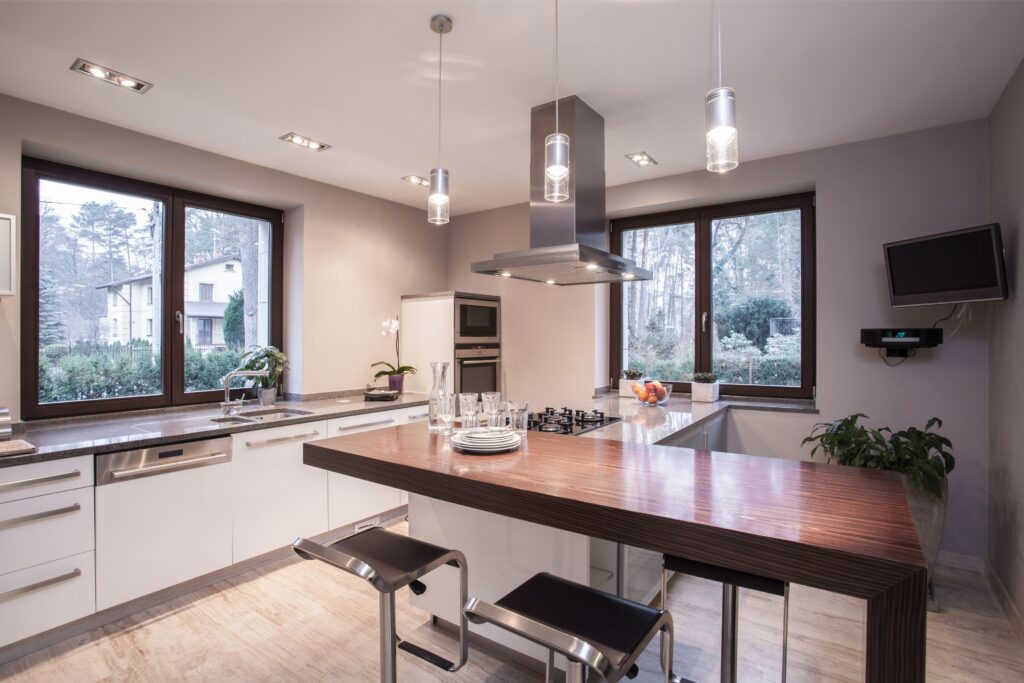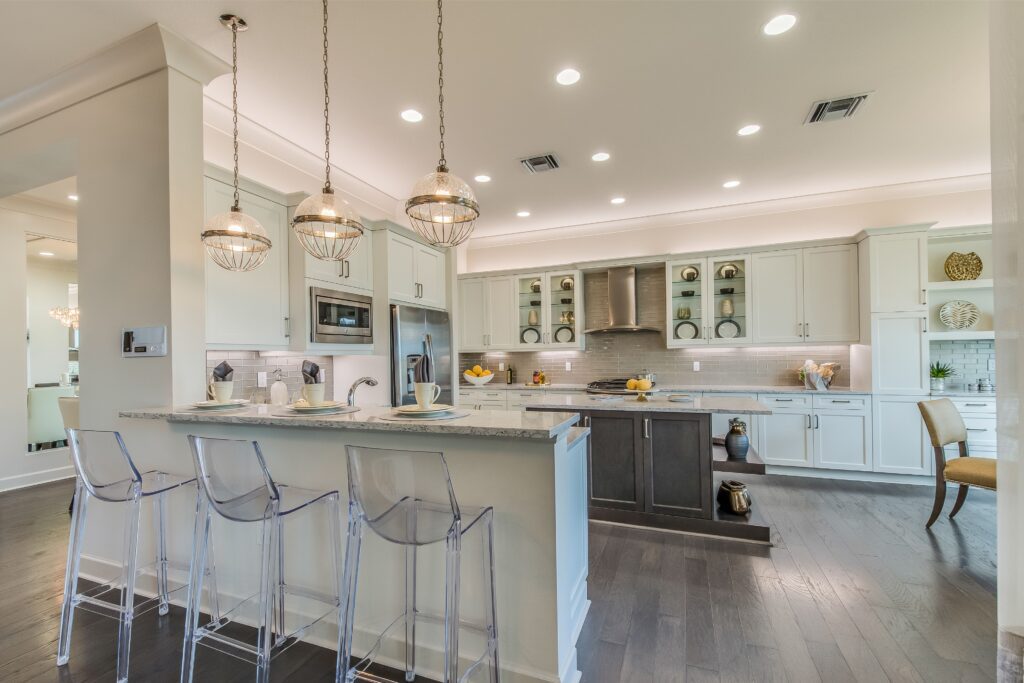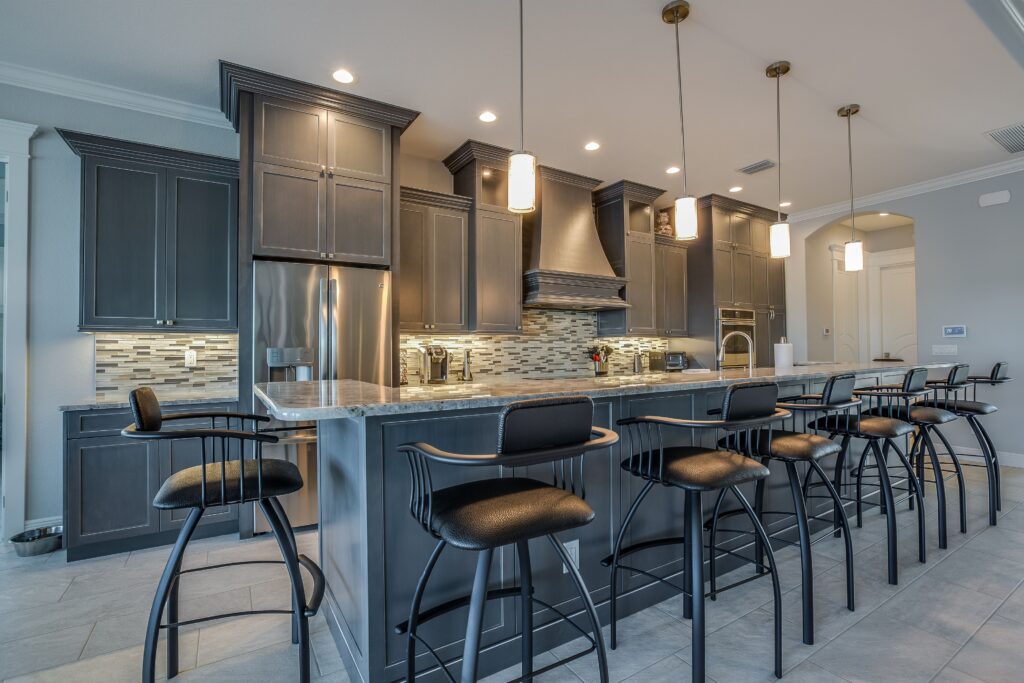
A Comprehensive Guide to Perfect Kitchen Lighting for Your Remodel
In this guide, we’ll delve into the crucial aspect of kitchen remodeling often overlooked – kitchen lighting. We’ll explore various lighting options and design strategies to help you create the ideal lighting scheme for your kitchen renovation project.
Understanding the Importance of Lighting in Your Kitchen
The Role of Lighting in Setting the Mood
Kitchen lighting not only illuminates but also sets the mood and enhances the overall design of a space. In the kitchen, where diverse tasks are performed, from cooking to entertaining, a well-designed lighting plan is indispensable.
Task Lighting: Illuminating Your Workspaces
Under-Cabinet Lighting for Enhanced Visibility
Under-cabinet lighting is indispensable for illuminating countertops, aiding in meal preparation, and enhancing visibility during tasks like chopping ingredients.
Focused Illumination Above the Stove
Proper lighting above the stove or cooktop is essential for clear visibility while cooking. Installing a range hood with integrated lighting or pendant lights can serve this purpose effectively.
Ambient Lighting: Creating Comfortable Illumination

A Comprehensive Guide to Perfect Kitchen Lighting for Your Remodel
Utilizing Recessed Ceiling Lights
Recessed ceiling lights provide uniform illumination throughout the kitchen, creating a comfortable and inviting ambiance. Dimmer switches offer flexibility in adjusting brightness levels.
Choosing Ceiling-Mounted Fixtures
Ceiling-mounted fixtures like flush-mount or semi-flush-mount lights offer another option for ambient lighting, adding to the overall aesthetics of the kitchen.
Accent Lighting: Adding Drama and Visual Interest
Highlighting Architectural Features
Accent lighting can draw attention to specific architectural features or decorative elements, enhancing the overall visual appeal of the kitchen.
Incorporating In-Cabinet or Under-Cabinet Lighting
In-cabinet or under-cabinet lighting can serve as subtle accent lighting, highlighting display items and adding depth to the kitchen design.
Design Tips for Kitchen Lighting
Layering for Depth and Versatility
Combining task, ambient, and accent lighting creates depth and versatility in the kitchen’s lighting scheme, catering to various needs and activities.
Consideration of Layout and Size
Tailoring the lighting design to the kitchen’s layout and size ensures adequate illumination and minimizes shadows on work surfaces.
Embracing Dimmers for Flexibility
Dimmer switches offer flexibility in adjusting lighting intensity, allowing you to create the desired ambiance for different occasions.
Prioritizing Energy Efficiency with LED Lighting
Opting for energy-efficient LED lighting not only reduces electricity consumption but also offers longevity and customizable color temperatures.
Balancing Style and Functionality
Selecting lighting fixtures that blend with the kitchen’s design while meeting functional needs ensures a cohesive and visually pleasing outcome.
Seeking Professional Advice
When in doubt, consulting lighting designers or electricians can provide invaluable insights into the most suitable lighting options for your kitchen renovation project.
Conclusion

A Comprehensive Guide to Perfect Kitchen Lighting for Your Remodel
In conclusion, kitchen lighting is a crucial aspect of kitchen remodeling, influencing both functionality and aesthetics. By carefully considering task, ambient, and accent lighting, along with design principles and energy efficiency, you can create a kitchen space that is both practical and visually appealing.
Choose AMD Construction & Remodeling!
If you’re ready to embark on a kitchen remodeling journey that prioritizes both functionality and aesthetics, don’t underestimate the importance of kitchen lighting. Contact us today to discuss your kitchen lighting needs and let us help you illuminate your culinary adventures in Allen, TX. Give AMD Construction & Remodeling a call at 469-547-5887.
FAQs (Frequently Asked Questions)
1. What are the key types of lighting to consider in a kitchen remodel?
Task lighting, ambient lighting, and accent lighting are the primary types to incorporate for a well-rounded lighting scheme.
2. How can I ensure proper lighting in different areas of my kitchen?
Tailoring the lighting design to the layout and size of your kitchen ensures adequate illumination in all functional areas.
3. Are dimmer switches worth investing in for kitchen lighting?
Yes, dimmer switches offer flexibility in adjusting lighting intensity, allowing you to create the desired ambiance for various activities.
4. What are the benefits of LED lighting for kitchen remodels?
LED lighting is energy-efficient, long-lasting, and offers customizable color temperatures, making it an ideal choice for kitchen lighting.
5. Should I consult professionals for kitchen lighting design?
Seeking advice from lighting designers or electricians can help ensure you select the most suitable lighting options tailored to your kitchen’s needs and aesthetics.
